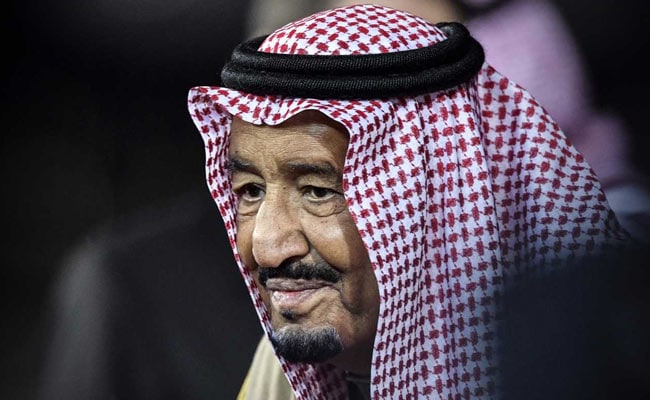
King Salman quashed abdication claims, dismissed rumours about Crown Prince's ascend to the throne. (AFP)
King Salman isn't planning to abdicate in favor of his son, a senior Saudi official said, dismissing mounting speculation that Crown Prince Mohammed bin Salman will soon ascend to the throne.
"There is no possibility whatsoever that the king will abdicate,'' the official said in response to written questions. Saudi kings usually stay in power even when bad health prevents them from carrying out their job, the official said on condition of anonymity. He noted the example of King Fahd, who stayed on as monarch until his death in 2005 despite being gravely ill in the last few years of his reign.
Abdication is unthinkable especially since King Salman, 81, enjoys "perfect'' physical and mental powers, the official said. Those who suggest otherwise "do not understand royal customs and traditions in Saudi Arabia," the official said.
King Salman has already sidelined senior princes as his son rose to power. Prince Mohammed, 32, was named heir to the throne in June after replacing his cousin. Last week, Prince Miteb bin Abdullah was also dismissed from his post as head of the National Guard as part of what authorities described as a sweeping anti-corruption drive, reinforcing speculation that the crown prince was on the cusp of becoming king.
The government will have difficulty credibly denying that speculation "because no one expects them to acknowledge it as a possibility before it happens," said Graham Griffiths, an analyst at consultancy Control Risks in Dubai. "As a result, rumor and speculation will continue to abound."
There is one precedent of a Saudi monarch stepping down while still alive. King Saud bin Abdulaziz abdicated in favor of his brother and heir, Prince Faisal, in the mid-1960s after pressure from ruling family members. The prince had already claimed broad powers to counter a financial crisis that engulfed the kingdom at the time.
Eurasia Group in September said the royal palace was finalizing plans to transfer power allowing "the father to oversee the transition and prevent dissent from other powerful members of the ruling family."
Prince Mohammed already controls almost all levers of government. He oversees defense, oil and economic policies. He has vowed to wean the Saudi economy off its reliance on oil and return to a more moderate form of Islam.
While all signs now point to an orderly succession in a few years' time, discontent with Prince Mohammed's domestic reform program and foreign policy initiatives "could increase the family's willingness to challenge him,'' Griffiths said.
(This story has not been edited by NDTV staff and is auto-generated from a syndicated feed.)
"There is no possibility whatsoever that the king will abdicate,'' the official said in response to written questions. Saudi kings usually stay in power even when bad health prevents them from carrying out their job, the official said on condition of anonymity. He noted the example of King Fahd, who stayed on as monarch until his death in 2005 despite being gravely ill in the last few years of his reign.
Abdication is unthinkable especially since King Salman, 81, enjoys "perfect'' physical and mental powers, the official said. Those who suggest otherwise "do not understand royal customs and traditions in Saudi Arabia," the official said.
King Salman has already sidelined senior princes as his son rose to power. Prince Mohammed, 32, was named heir to the throne in June after replacing his cousin. Last week, Prince Miteb bin Abdullah was also dismissed from his post as head of the National Guard as part of what authorities described as a sweeping anti-corruption drive, reinforcing speculation that the crown prince was on the cusp of becoming king.
The government will have difficulty credibly denying that speculation "because no one expects them to acknowledge it as a possibility before it happens," said Graham Griffiths, an analyst at consultancy Control Risks in Dubai. "As a result, rumor and speculation will continue to abound."
There is one precedent of a Saudi monarch stepping down while still alive. King Saud bin Abdulaziz abdicated in favor of his brother and heir, Prince Faisal, in the mid-1960s after pressure from ruling family members. The prince had already claimed broad powers to counter a financial crisis that engulfed the kingdom at the time.
Eurasia Group in September said the royal palace was finalizing plans to transfer power allowing "the father to oversee the transition and prevent dissent from other powerful members of the ruling family."
Prince Mohammed already controls almost all levers of government. He oversees defense, oil and economic policies. He has vowed to wean the Saudi economy off its reliance on oil and return to a more moderate form of Islam.
While all signs now point to an orderly succession in a few years' time, discontent with Prince Mohammed's domestic reform program and foreign policy initiatives "could increase the family's willingness to challenge him,'' Griffiths said.
(This story has not been edited by NDTV staff and is auto-generated from a syndicated feed.)
Track Latest News Live on NDTV.com and get news updates from India and around the world

